These perfectly wrapped gifts from nature are anything but basic
Words Ellie Shortt
Photography Lia Crowe
Fragility. Fertility. New life. New beginnings. Springtime. Sustenance. What comes to mind when you picture an egg? What kind of egg do you picture? Is it still in its shell or cracked open? Raw or cooked?
I think of my childhood. I recall comforting meals of omelettes with side salads or scrambled eggs on toast—more often finding their way into our dinner rotation than breakfast routine. I see the Passover Seder spread and feel my teeth sink into that satisfying first bite of a hardboiled egg after waiting so eagerly for those precious first courses. I’m transported to the kitchen table of my friend’s house, making pysanka—carefully poking a hole in the bottom of the shell, getting sore cheeks while blowing out the innards and meticulously dotting with wax, dipping into dye, wiping it down and repeating with patience and pride as I complete my delicate masterpiece. I hear the catchy jingle of those energetic “Get Cracking” commercials of the ‘80s.
There are seemingly endless associations with eggs and equally endless things to do with them. Is it going to be part of a cake? An ingredient in a salad dressing or sauce? Or an over-easy buddy to some bacon? Sweet, savoury, brilliant or bland, there is a world of possibilities all starting with the modest egg.
But these perfectly wrapped gifts from nature are anything but basic. At the beginning of any great foundation of appreciation comes the art of understanding, and for so many of us we crack, whisk, fry and poach without much awareness as to what has gone into this culinary staple, arguably the very “staple” of life as we know it—for without the egg, the ovum, the seed and the kernel from which all things spring forth…there isn’t life.
Let’s start with the shell. Made almost entirely of calcium carbonate crystals, an eggshell is surprisingly a semipermeable membrane, which means that air and moisture can pass through its pores. However, the shell also has a thin outermost coating called the bloom or cuticle that miraculously helps keep out bacteria and dust.
Fragile yet somehow resilient, an eggshell is almost unbreakable when squeezed from top to bottom, but a mere tap can crack open the armour exposing the contents within. This gooey core is cradled by inner and outer membranes, which provide further defence against bacterial invasions. The egg white is also known as the albumen, and contains about 40 different types of proteins, many of which are otherwise tricky to find in such bioavailable capacities.
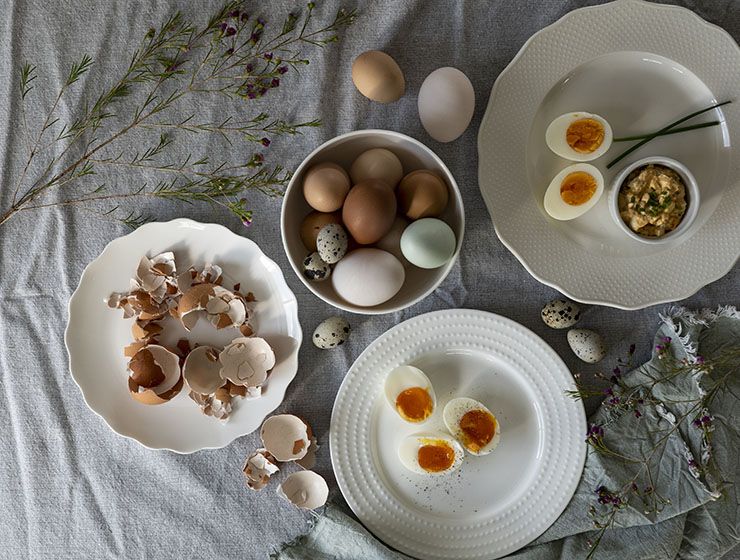
Then there are the chalazae—opaque ropes of egg white, which hold the yolk in the centre of the egg like little anchors, and attach the yolk’s casing to the membrane lining the eggshell. Finally we reach the yolk, the most nutrient-dense and, in my humble opinion, tastiest part of the precious package.
Held together by the vitelline membrane, the yolk contains less water and more protein than the white, some fat and most of the egg’s vitamins and minerals. These include iron, vitamin A, vitamin D, phosphorus, calcium, thiamine and riboflavin. The yolk is also a source of lecithin, an effective emulsifier so your body can better absorb the fabulous fat within. The colour ranges from just a hint of yellow to a magnificent deep orange, according to the feed and breed of the hen. Ideally we want our barnyard birds running around free and chatty on a farm, eating all sorts of yummy delights, including bugs and the like (nope—chickens aren’t supposed to be only veggie-fed), which not only provides a happier existence for our fowl friends, but offers us more delicious and nutritious eggs.
Of course, this is all regarding the most commonly consumed egg in our western culinary paradigm, but there are many different eggs to explore, including duck, quail and ostrich, all of which present distinctive flavour and nutrient profiles. For example, duck eggs are notably rich, excellent in a fresh pasta recipe, for example. Pickled quail eggs make for a lovely little pop-in-your-mouth treat. Hard to acquire and lavishly priced, ostrich eggs are often eaten on their own, soft-boiled for an hour (yes, an hour), chiselled open and seasoned simply before offering a most-indulgent dipping pool for your bread. But many adventurous cooks will attempt mega omelettes and scrambles with these monstrous capsules of extravagance.
From a nutritional perspective not all eggs are created equal. Duck eggs tend to contain higher amounts of many nutrients than chicken eggs, including folate, iron and vitamin B12 (as much as 168 per cent or more of the daily recommended dose of B12). Quail eggs contain more fat and protein by weight than chicken eggs, double the iron and riboflavin, about one-third more vitamin B12, but less choline. Ostrich eggs are richer in magnesium and iron than chicken eggs, but contain less vitamin E and vitamin A.
Perhaps one of the most versatile and adaptable, yet under-appreciated applications of cooking an egg is that of the perfectly executed and timed boil. There are as many different methods and opinions on this subject as there are sizes and colours of eggs, but I personally stick to the simple method of placing an egg in boiling water for the allotted time and carefully relocating it to an ice bath for a couple minutes before peeling (or cracking in half as is the case for a soft boil). A slotted spoon, small sieve, or mesh basket with a long handle can really help in safe transfer in and out of the water, but aside from that, you just need a pot, a timer and your eggs.
See method below.
And where you take your boiled egg from here is up to you! For soft-boiled, I’m a big fan of the quaint yet refined minimalism of salt, pepper and some toast sticks. Medium goes marvellously on a bed of greens, and there’s nothing quite like a hard-boiled egg salad to enjoy with crackers, or sandwiched between two slices of a rustic loaf.
Wherever your egg adventure takes you, perhaps take a moment to pause and appreciate the structural brilliance, the nutrient density, the gorgeous visuals, the rich flavours and the culinary possibilities of the (not so) humble egg.
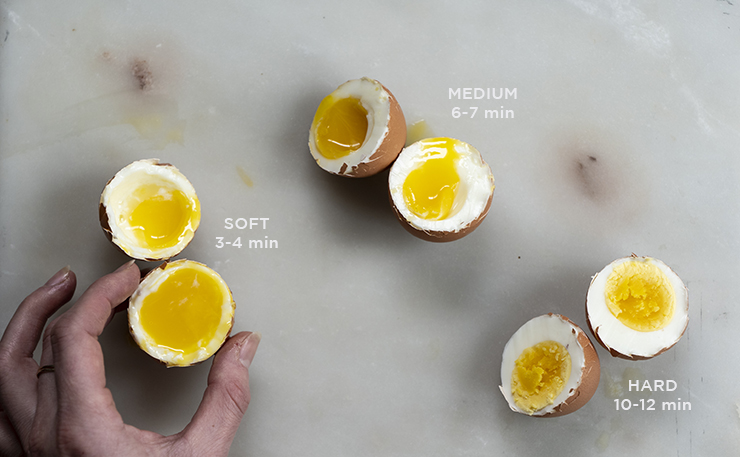
How to Boil an Egg
While there are many differing opinions and methods, I find this simple approach to be efficient and effective, and most importantly, easy to peel! While it’s best to enjoy a soft boil fresh out of the water so that it’s still warm and lovely, the medium- and hard-boiled eggs are a great make-ahead option, and should keep in the fridge for a few days.
Directions
Bring a saucepan of water to a boil over medium-high heat. Using a slotted spoon or small sieve with a handle, carefully lower your eggs into the boiling water one at a time. Set desired time (3-4 minutes for soft, 6-7 for medium and 10-12 for hard), adjusting heat to maintain a gentle boil. Transfer eggs to a bowl of ice water and chill until just slightly warm, about 2 minutes.
Gently crack eggs all over and peel, starting from the wider end, which often contains the air pocket.
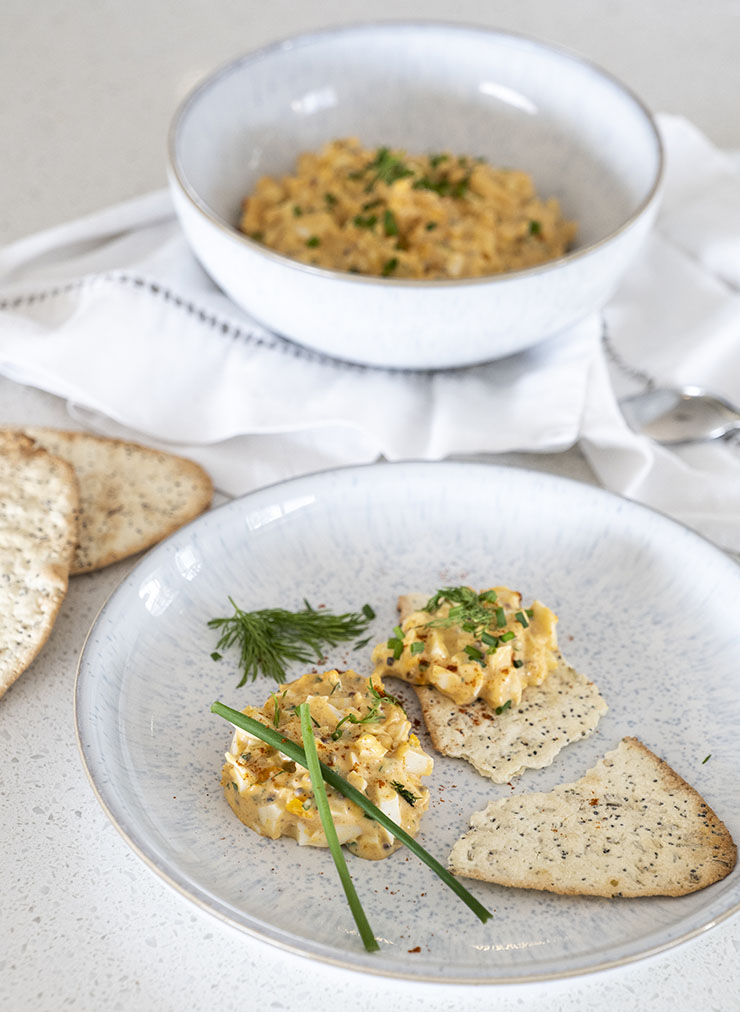
Egg Salad with Fresh Herbs and Grainy Mustard
Prep time: 15 minutes (including boiling time)
Yield: 2-4 servings
Ingredients
6 hard-boiled eggs, peeled and finely chopped
½ cup mayonnaise or aioli
1 tbsp grainy mustard
½ tsp paprika
1 tbsp fresh Italian parsley, finely chopped
1 tbsp fresh chives, finely chopped
1 tbsp fresh dill, finely chopped
Sea salt and freshly cracked pepper to taste
Directions
Combine all the ingredients in a medium-sized mixing bowl, mashing and stirring to fully integrate them all together, and enjoy! Can be stored in the fridge for up to one week.
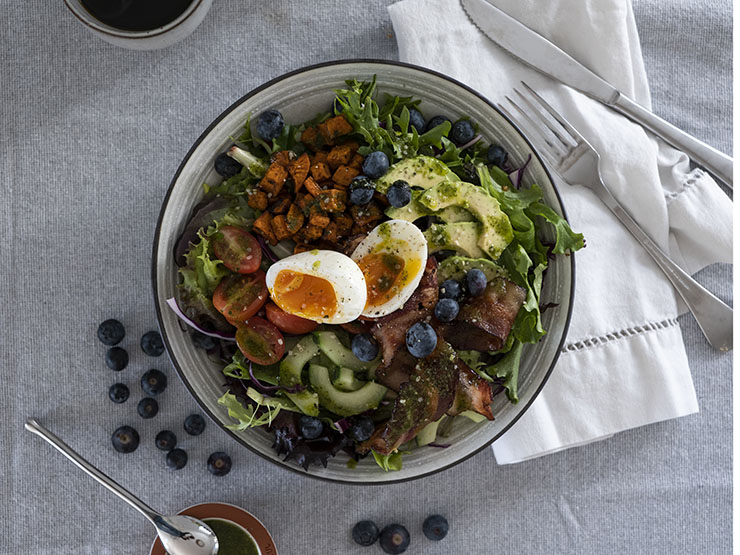
Rainbow Breakfast Bowl
Prep time: 20-30 minutes (including cooking and boiling time)
Yield: 2 servings
There’s nothing quite like beginning your day with a splash of sunshiny colour, and this vibrant dish is sure to start you on the right foot. Satiating and sustaining, this abundant bowl of nutrient-dense goodness keeps me full and satisfied for hours. Prep all the ingredients ahead of time to expedite the assembly process during your early morning routine.
Ingredients
For the salad…
1 cup roasted sweet potato cubes (see instructions below)
2 medium-boiled eggs, peeled and cut in half
4 slices of bacon, cooked to your liking
½ cup cherry or grape tomatoes, cut in half
1 cup cucumber, peeled, cored and sliced (you only need to peel and core it if it’s a field cucumber)
½ avocado, sliced
½ cup blueberries
1 cup shredded purple cabbage (I like to use a mandoline to get it extra fine)
4 cups mixed greens
Sprinkle of hemp hearts
For the dressing…
½ cup olive oil
2 tbsp fresh lemon juice
1 tbsp fresh orange juice (or just more lemon juice)
1 tsp maple syrup
1 clove garlic, minced
1⁄3 cup fresh Italian parsley, finely chopped
1 tbsp fresh tarragon, finely chopped
Sea salt and freshly ground black pepper to taste (I did about ½ tsp salt and ¼ tsp pepper)
Directions
For the roasted yam or sweet potato…
Preheat your oven to 425F and line a baking sheet with parchment paper. Peel and cut the sweet potato into small cubes. In a medium-sized mixing bowl, toss the sweet potato cubes with a glug of olive oil and a sprinkling of sea salt and freshly cracked black pepper.
Spread the cubes evenly on the baking sheet and roast for 15-20 minutes until fork tender. Set aside to cool.
For the dressing…
Add all the ingredients in a bowl and whisk together until thoroughly combined (you can also combine the ingredients in a small blender and whir for a few seconds until integrated).
To assemble the salad…
In two separate dishes, divide the greens and sweet potato mix, creating a base for each bowl. Arrange the other ingredients evenly on top of each base, drizzle with desired amount of dressing, sprinkle with a bit of hemp hearts and enjoy!

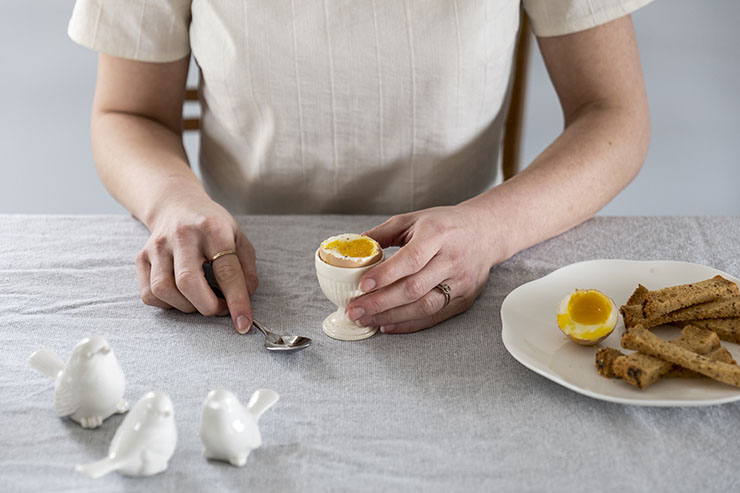
 Malta the amazing
Malta the amazing